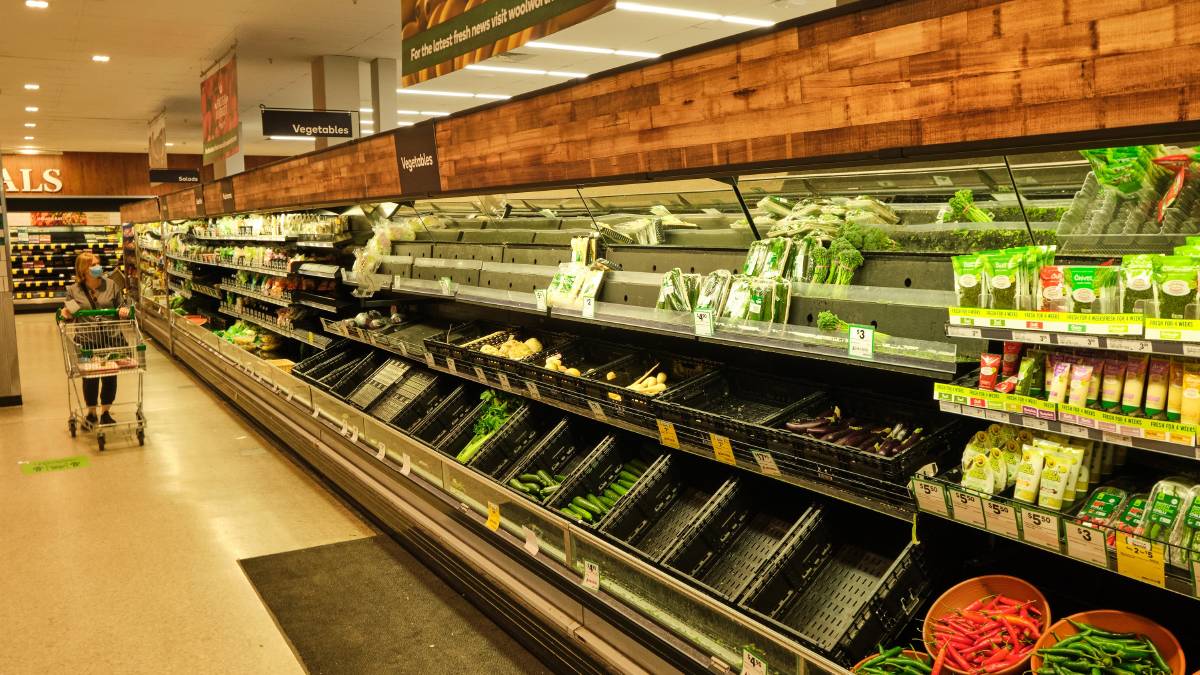The unforeseen impact of COVID-19
Unless you’ve been living under a rock – or you’ve been in isolation – you would have noticed the impact of COVID-19 on our food supply chains.
Certain foods have disappeared from the shelves, and as COVID-19 cases rise, more and more workers in the food supply and distribution sector have been affected, in turn slowing food transport to supermarkets.
Online and in-person shopping has equally been affected, with Coles simply cancelling orders of some items and Woolworths showing a reduced range.
It’s not only obtaining food that is the problem.
A shortage of staff leads to drastic measures
The delivery method has been impacted, too, with some supermarket delivery workers unwilling to enter enclosed areas such as flat complexes for fear of COVID-19 infection.
Even one infection could profoundly affect the numbers of staff available for their work.
They are already short-staffed, and they can’t afford to lose more personnel.
To quell food shortage issues, NSW Health changed isolation requirements for food logistics workers to those that apply to healthcare workers.
There are “critical workers” in agriculture, manufacturing, and transport, not just in the medical field.
This virus is showing us where our vulnerabilities lie in our food supply.
Abundant food available at Australia’s fresh food markets
But not every source of food is so threatened.
While supermarkets are groaning under the strain of their affected global and interstate supply chains and impacted staff levels, fresh food markets are flourishing.
Woolworths CEO Brad Banducci has been on record as stating, “It’s not yet clear how soon the system will come back into balance as we move through the Omicron wave.”
Over the past few months, their operation has been “experiencing COVID-driven absences of 20%+ in our distribution centres and 10%+ in our stores”, but fresh food markets don’t face the same pressures.
By comparison, according to Stan Liacos, Chief Executive of Melbourne’s Victoria Market, “the way they [market stallholders] purchase has for more flexibility in it than the way the far larger multinational supermarket chains do business.”
Market stallholders have many suppliers to choose from, unbound by the exclusive supplier contracts that the big companies are chained to.
If one supplier doesn’t have something they need, they just turn to another one.
Similarly, market stallholders are free of the logistics nightmare that the big two supermarkets face because they do a lot of their driving themselves.
They invest less in stock as they only buy what they immediately need.
The meat supply is not a problem, as carcasses are supplied in a whole state to be cut up by individual operators.
All in all, the fresh food market stallholders are operating with a level of freedom and flexibility that the big supermarkets can only dream of.
It will be interesting to see if they learn from this event, working on increasing responsiveness and suppleness in times of unprecedented change.
What can we learn from COVID-19?
Perhaps COVID-19 is just the fire drill we need to rethink supply chains nationally and globally.
In the Harvard Business Review, discussing the impact of COVID-19 on global supply chain management, Willy C. Shih writes:
The economic turmoil caused by the pandemic has exposed many vulnerabilities in supply chains and raised doubts about globalization. Managers everywhere should use this crisis to take a fresh look at their supply networks, take steps to understand their vulnerabilities, and then take actions to improve robustness… leaders should find ways to make their businesses work better and give themselves an advantage. It’s time to adopt a new vision suitable to the realities of the new era—one that still leverages the capabilities that reside around the world but also improves resilience and reduces the risks from future disruptions that are certain to occur.
If you run a logistics business or a food processing site, you need to consider your supply chain vulnerabilities.
How can you lower your risks?
How can you diversify your suppliers or your clients so that no one source of product or income defines your ability to operate?
Let National Food Institute And National Logistics Institute partner with you
Our broad umbrella RTO, National Food Institute, also houses National Logistics Institute, our zealous logistics training off-spring.
We are uniquely placed to offer customised training to both the food processing and logistics industries.
Our training provides valuable insights that can boost the performance of your team.
If you need training for your operation, get in touch with us today at National Food Institute.

